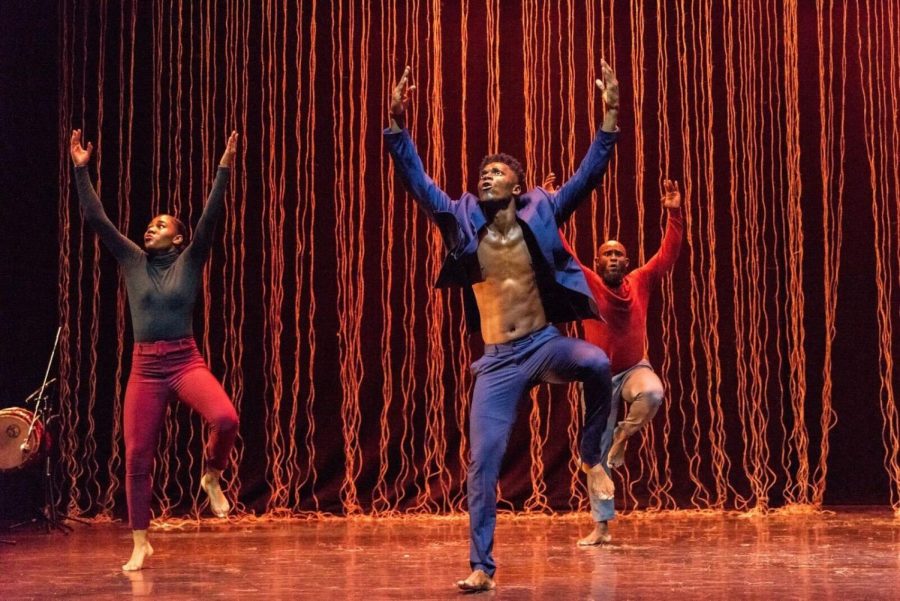Celebrity Series of Boston highlights performances about Black culture
Members of Afro-Colombian dance group Sankofa Danzafro performing “Accommodating Lie,” following a narrative that explores the stereotypes and politics of the Black body through movement. Photo credit to Elsie Management.
February 19, 2022
Non-profit arts organization Celebrity Series of Boston is getting ready to host three performances centering Black culture and social justice in The Movement Series, starting Feb. 26 and running through May 1.
Afro-Colombian dance group Sankofa Danzafro’s Feb. 26 and 27 dance performance “Accommodating Lie” explores the stereotypes and politics of the Black body through movement.
Poet, playwright and dancer Marc Bamuthi Joseph utilizes multimedia formats such as spoken word, song and dance to create commentary on how America’s legal system and over-policing has affected Black fatherhood in “The Just and the Blind,” which will play April 1 and 2.
The Alvin Ailey American Dance Theater will perform a mixture of new and classic works in the group’s return to Boston, including a signature piece “Revelation” from April 28 to May 1.
These performances mark a return to in-person entertainment. Nicola Williams, president of the event planning firm The Williams Agency, helped bring these groups to Boston to promote the intersection of performing arts and social justice.
“The Celebrity Series chose these three presentations in particular because they’re centered around dance [and] they all have a connecting thread of social justice through them,” Williams said.
She said she believes that these shows will amplify activist-oriented messages and help connect different audiences to a variety of artistic topics through education and entertainment. The diversity of the performers and shows allow Boston residents to relate to the stories told, Williams said.
“This is a great way to let the community know that the Celebrity Series is going on a journey of not only offering more diverse and inclusive programming but also growing internally and externally,” Williams said.
From its beginning in 1938, Celebrity Series has been partnering with acclaimed talent from all over the country to provide entertainment. According to its website, Celebrity Series brings over 65 performances in eight to 10 venues and over 150 community events annually. The “Arts for All!” community events consist of free concerts at local neighborhood venues, classes with mainstage artists and participatory performance projects.
The Subscription Series has been their main event since the organization’s beginning in 1938. They bring in talent from all over the world to create a diverse lineup of performances like The Movement Series.
Sankofa Danzafro partnered with the Celebrity Series in 2018 for “The City of Others,” a performance about wealth, sexual orientation and race issues among marginalized communities in Colombia. In 2020, the dance crew put together “Black Voices of Boston,” a virtual compilation of dance-based stories from seven Boston residents. The group’s upcoming shows will bridge the gap between African and Latin history.
“Boston has a large Afro-Latino community. This is a great way to connect that community to this kind of African culture because it’s not as represented as others, especially in art. This being performed during Black History Month makes it even more special,” Williams said.
Meanwhile, The Alvin Ailey American Dance Theater has been working with the Celebrity Series for over 50 years. New and returning spectators can expect to see new and classic performances. As a historically-Black organization, its local performances have become a tradition for some Boston residents like Aisha Zamani.
“I grew up going to Alvin Ailey’s performances here. I loved being able to watch people that looked like me dance on stage. My dream career growing up was actually to become a dancer because of them. That didn’t pan out, but their performances still mean a lot to me,” Zamani said.
In 2008, the United States Congress deemed Alvin Ailey to be an essential cultural ambassador to the world due to its international success and influence. According to Congress’ website, the company has performed for almost 25 million people in 48 states and 71 countries, leaving behind a lasting impact.
As a Roxbury native, Zamani said she is excited to see all three performances highlighted instead of just Alvin Ailey’s. Growing up she had heard from family members visiting the area that Boston seemed to lack diversity, which was surprising to her because she’d grown up around other people of color from all backgrounds.
“There’s so many people of color in this city. It has so much history and culture. These performances are going to be a great way to showcase what Boston has to offer with Black culture specifically. I hope my community really comes out and shows them love,” Zamani said.
Joseph has worked with composer Daniel Roumain and director Yoram Savion to produce “The Just and the Blind,” a multimedia show that immerses audience members in a powerful experience. Grammy-nominated singer DéboRay, a Berklee College of Music alumna, will be featured. This performance will be its Boston debut despite its national acclaim.
Using film, song, music and dance, performers will explore ideas of racial profiling and biased sentencing in the legal system and the effect this has on Black children.The show will serve as a way to humanize marginalized communities and what they go through as a result of systemic oppression.
“The uniqueness of this show is unlike anything the audience will have seen before. The way it switches between media and dance will be sure to captivate anybody watching. And the fact that those attending this show will be the first ones to ever see it performed in Boston makes it even more exciting,” Williams said.
Spreading messages of social justice through performing arts is not new, but it has become more prevalent in recent years. Emerson University’s Co-Chair of Performing Arts Amelia Broome believes that the industry’s attitude towards racial injustice is shifting more.
“People are fed up with the way things have been run in the past. Theater has had tones of patriarchy and white supremacy for a long time, but performers and producers are saying enough is enough,” Broome said.
There is also an attitude shift towards the treatment of performers in the industry. While theater has been considered to be competitive and exhausting on dancers, producers lately have been taking their well-being into consideration more when making decisions.
“We’ve been asking our performing arts students one thing we can do for them. Just one thing that can alleviate their stress or anxiety. While there were many different answers, the consensus was ‘have mercy on us’. Life is already complicated and preparing to perform for live audiences again has everyone a little on edge,” Broome said.
Within the industry, more conversations regarding casting and portrayal in productions have taken place. There is more focus on inclusivity and featuring Black characters as the lead, not a secondary character.
“I think that these kinds of performances remind us of our shared humanity. It helps dissolve this perceived barrier between groups of people,” Broome said. “These issues are always going to be in the conversation. We have to approach it from every angle, including performing arts.”


















